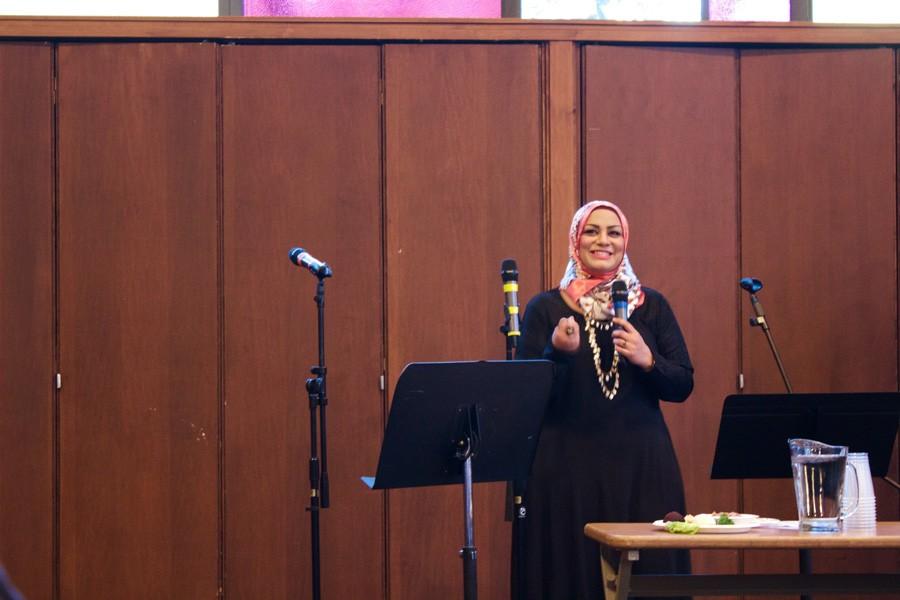Jewish Council on Urban Affairs’ annual Passover Seder focuses on Islamophobia, solidarity with Muslims
Benjamin Goldberg/The Daily Northwestern
Tahera Ahmad, associate chaplain and director of interfaith engagement, speaks at the Jewish Council on Urban Affairs’ annual Freedom and Justice Seder on Monday evening. With over 300 people present at the event, the focus of this year’s Seder was Islamophobia and standing up for Muslims within the Chicago community.
April 12, 2016
The Jewish Council on Urban Affairs hosted its annual Freedom and Justice Seder on Monday night, focusing on Islamophobia and the importance of standing alongside Muslims during a time filled with hatred in the public realm, said Judy Levey, executive director of JCUA.
More than 300 people attended the event held at the Beth Emet Synagogue, 1224 Dempster St. It was part of JCUA’s Jewish-Muslim Community Building initiative, which works to promote education and understanding between the two religious communities.
“As Jews, our collective history of oppression makes us particularly sensitive to people today who face discrimination and bigotry,” Levey told The Daily. “So we stand in solidarity with those people around issues in Chicago to say that we’re in this together and we care.”
JCUA is a 51-year-old Jewish social justice organization founded by rabbis who marched with Martin Luther King Jr. and felt there needed to be a Jewish voice fighting against racism, discrimination and anti-Semitism in the Chicago area, Levey said.
To represent the four cups of wine traditionally consumed with Passover Seder, there were four speakers at the event, which focused on solidarity with the oppressed: Tahera Ahmad, associate chaplain and director of interfaith engagement; Michael Simon, executive director of Northwestern Hillel; Larycia Hawkins, former professor at Wheaton College; and Robert Bloch (Law ‘84), who served as Hawkins’ attorney in her case against Wheaton College. Each of the speakers discussed the importance of religious solidarity in terms of their personal experiences.
Ahmad spoke about a racist encounter she had while working the register of a private pharmacy where she was employed at the time. Her supervisor, who was Jewish, stood up for her in the situation and later invited Ahmad to her first ever Shabbat dinner at his home.
“During Shabbat, he told me something I would never forget,” Ahmad said. “He told me that even though he grew up in Skokie, he always felt very alone and was always afraid of sharing his identity, and then he said, ‘I don’t want you to feel that way.’”
Kalman Resnick, former vice president of JCUA and current co-chair of the annual fundraiser, was also present at the Seder. Resnick, who has been involved with JCUA since the mid-1980s, said the group’s programming aims to address issues that communities in Chicago are facing, and a large concern recently has been around the rise in Islamophobia.
“Unfortunately, Islamophobia is a real problem, and we have a man running for president, Donald Trump, who has suggested that we close the doors to Muslims — and that’s outrageous,” Resnick told The Daily. “We need to build strong coalitions against hatred among all communities.”
Resnick also said the Seder aimed to encourage Jewish-Americans to stand up for their “Muslim neighbors” and encourage Muslims to realize there is concern within the Jewish community for them, particularly at this time.
NU Hillel’s social justice and service group, ZOOZ, also helped coordinate the event, bringing 14 students to the Seder. Weinberg juniors Aitan Licht and Jessica Hoffen, ZOOZ co-presidents, said they want to recognize the history of oppression in Judaism and help others who are being oppressed today.
“There’s a responsibility of all people, but specifically in our religion, to take ownership of our responsibility to lead and be part of the initiative to help end oppression within our communities,” Hoffen said.
Email: [email protected]
Twitter: @fathma_rahman


